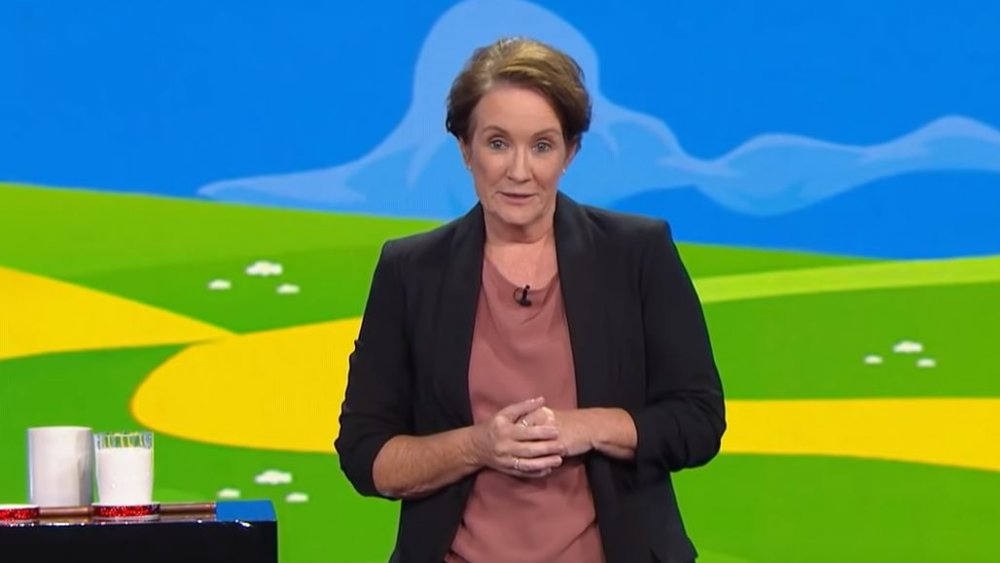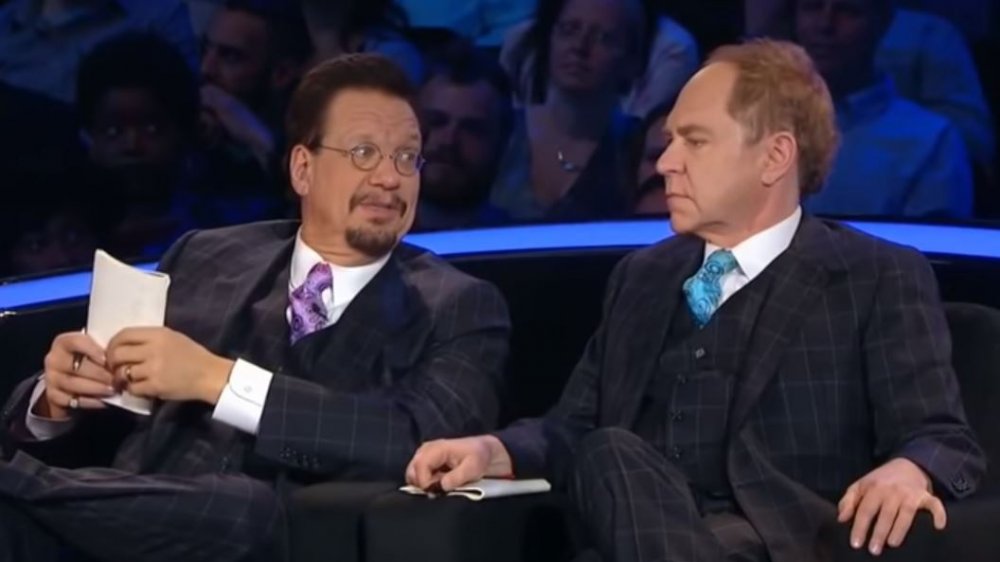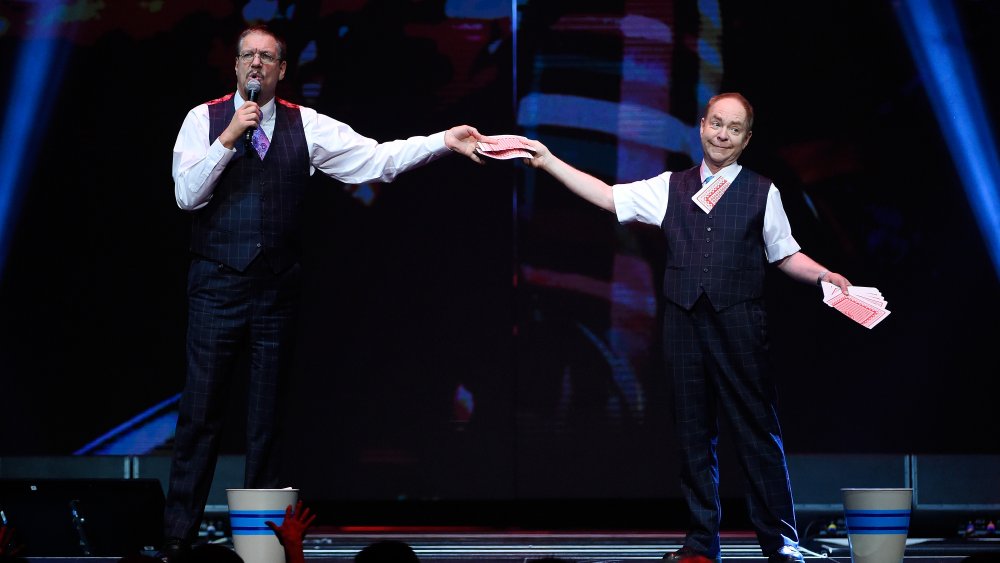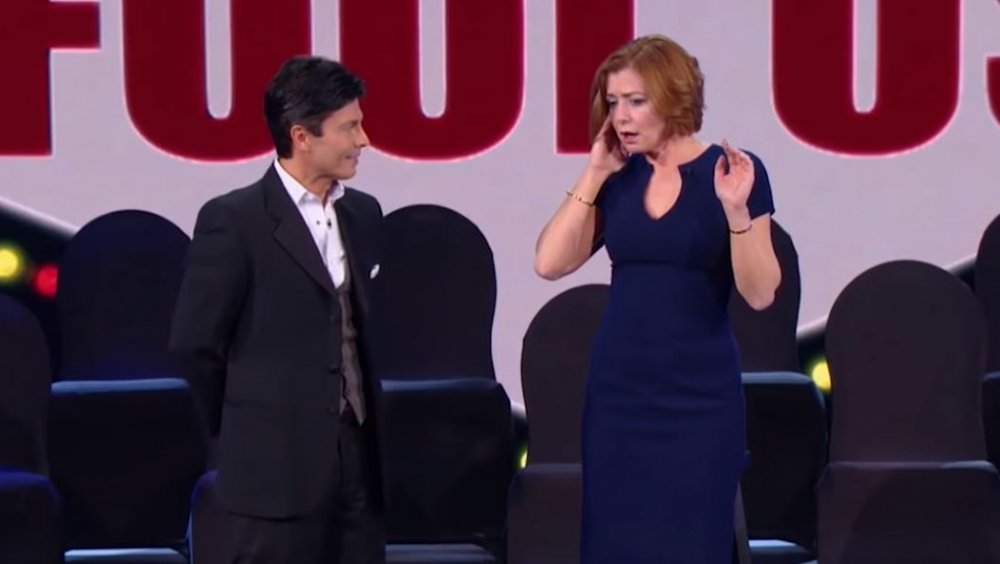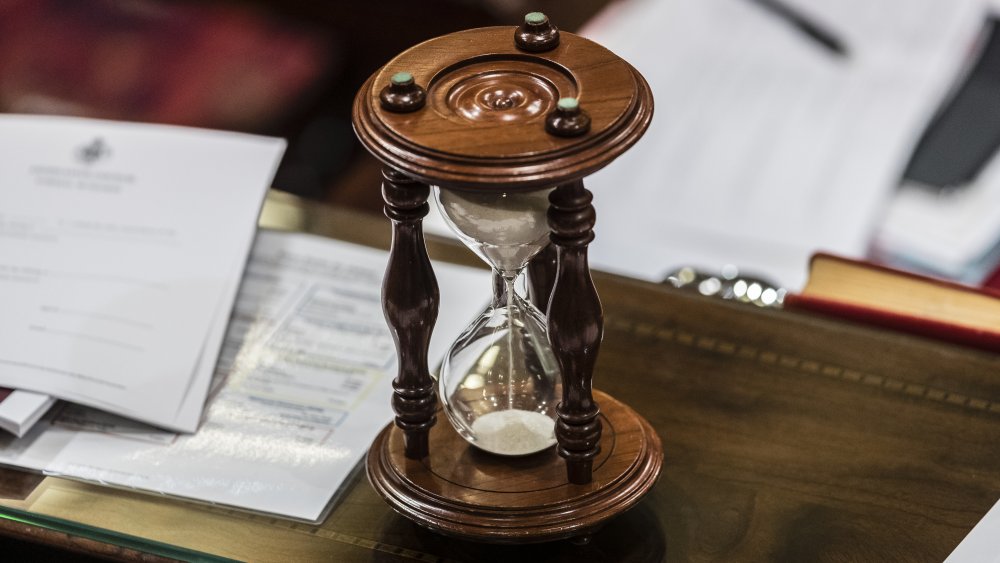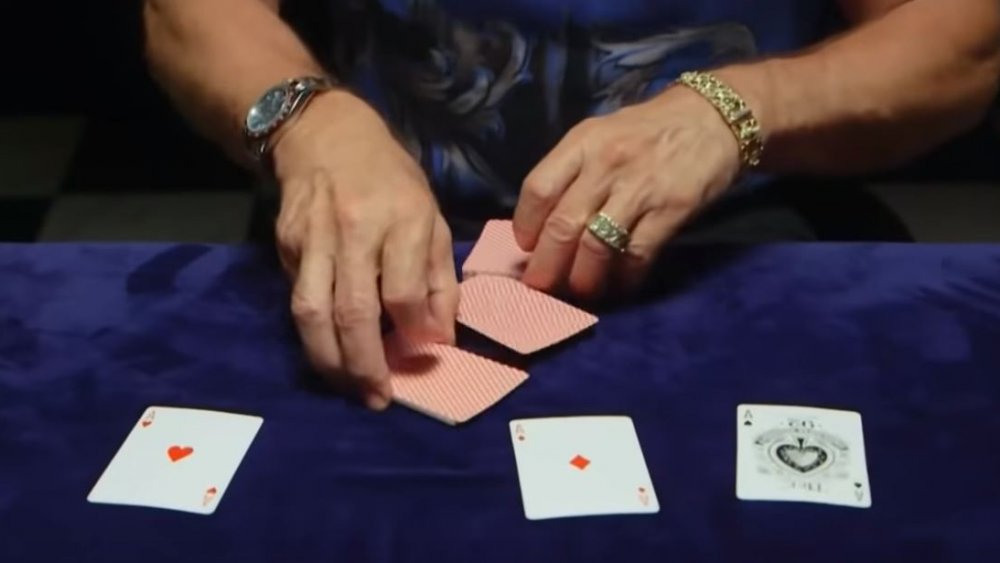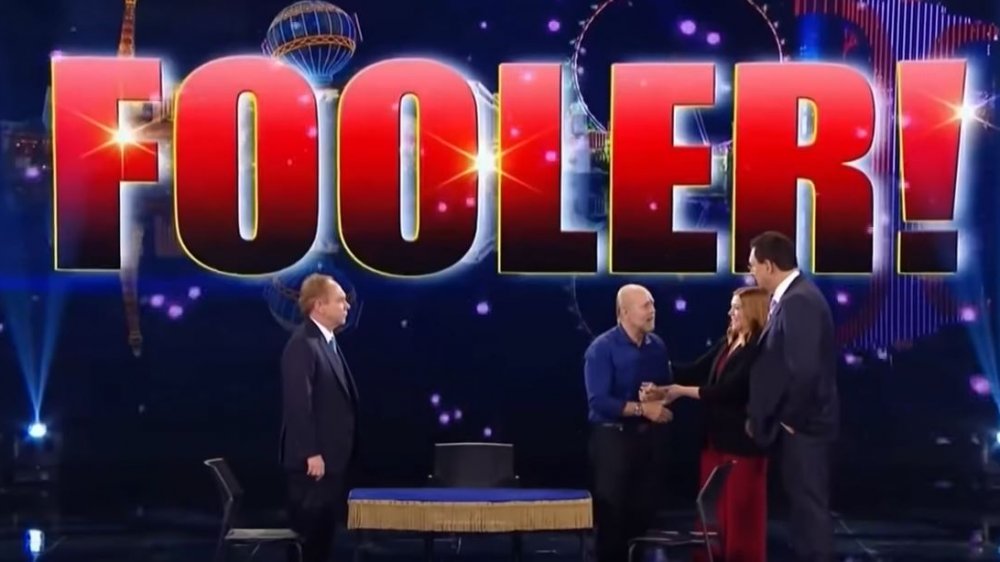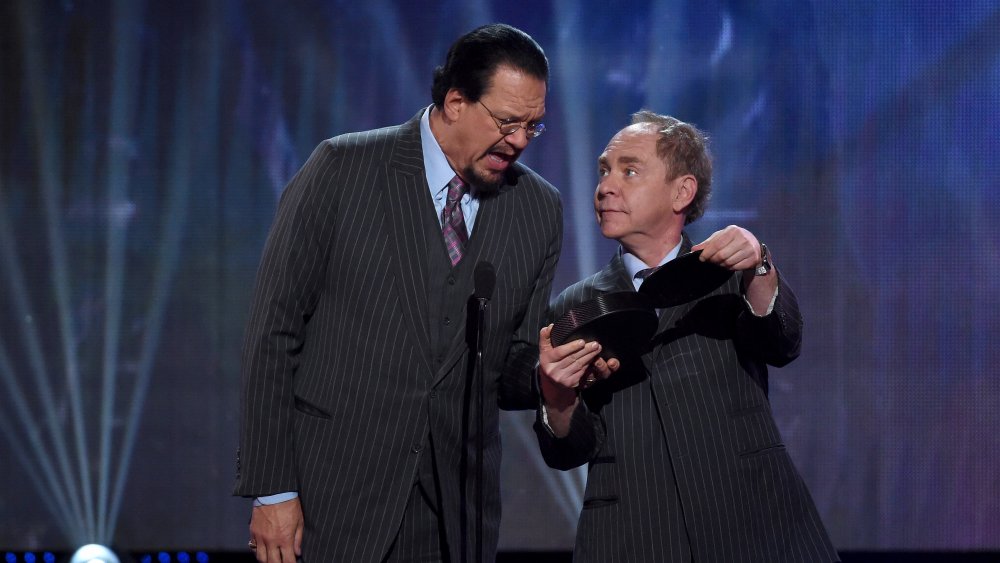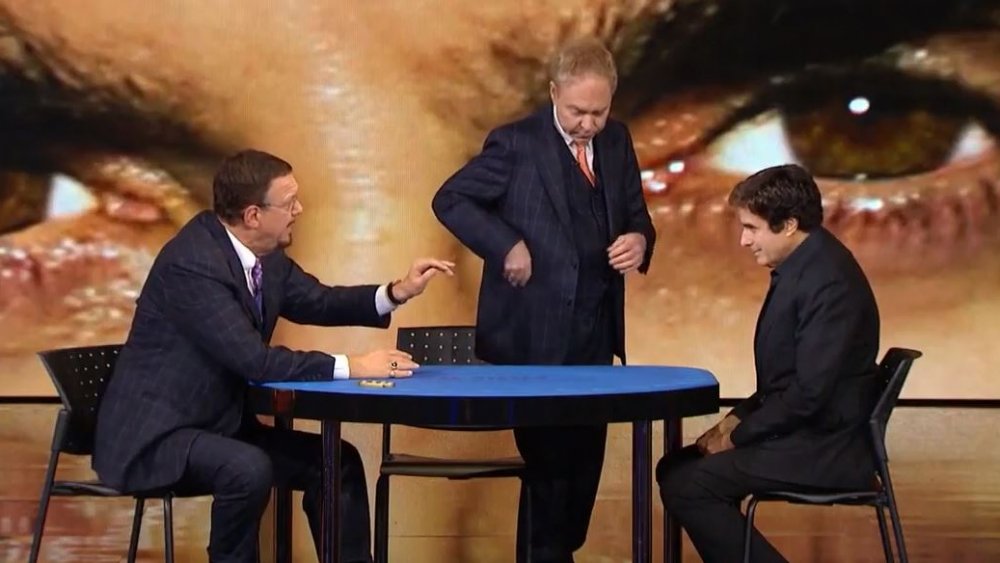The Untold Truth Of Penn & Teller: Fool Us
Penn & Teller: Fool Us started in England in 2011, got shut down, was revived on the CW in 2015, and has been a mainstay of the network since. The premise of the show is simple: a magician gets a five-to-ten minute set to show legendary magic duo Penn & Teller a trick, just once. Penn & Teller then try to guess how the trick was done. If they get fooled and can't figure it out, the magician in question receives a trophy and a spot in Penn & Teller's long-running Vegas show.
With half a dozen seasons and counting, not to mention YouTube videos with millions of views, it's been a ratings success and a creator of many a viral hit. It's arguably the most popular venue for magic in the country. As with anything involving magic, though, obfuscation and misdirection are the names of the game. There's more to the show than meets the eye, and here we present with you with the untold truth of Penn & Teller: Fool Us.
Women do better on Penn & Teller: Fool Us
Magic has a history of being a boys' club at best and being outright misogynistic at worst. The Magic Circle, Britain's biggest magic organization, has existed since 1905 but didn't allow women until 1991. Women were only seen as assistants and props until somewhat recently, and female acts are finding their way onstage more and more. Penn has seen an increase in little girls wanting to show him tricks in the past few years, and notes that his daughter is more interested in magic than his son. Fool Us in particular makes a conscious effort to include more female magicians.
It certainly helps that they're more successful at fooling Penn & Teller than their male counterparts. By Penn's own estimation, about 12 percent of contestants across the board fool them. There were six solo female magicians in season five. Of those six, five fooled them. This, by his estimation, is part of a larger trend — being outsiders forced women to learn magic in new ways
"Women who were excluded from that club have rhythms and styles and nuance to the way they do magic that I don't understand," says Penn. "And that's great!" He estimates that within the next five to ten years, the biggest star in magic will be a woman.
Same clothes, different show
During Alyson Hannigan's first season as host, fans noticed that she wore the same dress every episode. At the time, few acknowledged that previous host Jonathan Ross wore the same suit for two seasons, or that Penn and Teller wear the same pinstripe suits every time.
The show acknowledged this, stating via its publicist that "Alyson Hannigan's wardrobe is done for editing purposes. It's the same reason that Penn & Teller always wear the same suits and ties." This is a common aspect of reality TV in all its forms.
The simple truth is most of the season is shot within several days, with each day covering different kinds of acts. This allows the editors to splice together different acts from different days to make a cohesive but varied episode. Even though, for example, most card magic is shot on the same day, the same outfits allow editors to put a single card act on the same episode as mentalists and illusionists.
They drop code so fans can figure out tricks
After each act on Penn & Teller: Fool Us, Penn addresses the performer and explains how he thinks the trick works in code. Casual viewers might be baffled, but there's often enough in there to feel like the curtain is being lifted.
This is by design — it's because Penn & Teller want curious audience members to figure out the tricks. As with everything, it's not about exposing anyone — it's about fostering curiosity
Penn says that his explanations aim for the "15-year-old Penn & Tellers out there." His jargon includes "key word searches" so aspiring magicians can research the tricks they see. Teller notes that that the doublespeak helps teach people new techniques without spoiling the trick: "If we say, 'Does the term 'breather crimp' mean anything to you?' That takes somebody who might be really interested in card magic to Google 'breather crimp,' and they're going to learn a really cool thing that they might be able to use."
Penn & Teller hate reality shows
Penn & Teller: Fool Us is, ultimately, a TV talent show, which have existed since near the dawn of the medium. The tone, however, is different than most. It's far kinder and most of the acts are professionals instead of amateurs. This is all because Penn & Teller can't stand talent shows.
Penn believes that most talent show judges aren't the experts they claim. He believes that innovative acts like Bob Dylan and Tiny Tim would fail on American Idol while mediocre acts would succeed, and has said "I don't like it when people tell us what to watch or listen to." When he was given a talent show, he knew it had to be different.
A common aspect of reality shows is watching people fail, come up short, or otherwise embarrass themselves. Penn has no time for that. "The idea of watching someone do something difficult and enjoying their nervousness and failure," he says, "is not part of the way I want to live my life." He was also a contestant on Celebrity Apprentice and was disgusted by the way Donald Trump treated people. Penn considers Fool Us partial penance for his role in that.
The only point of Fool Us is as the title implies — can you fool these two judges? No value judgments are made, outside the occasional compliment from Penn & Teller. The audience decides whether an act is "good" or has staying power.
Penn & Teller: Fool Us was inspired by magicians sharing tricks
Penn & Teller have been Las Vegas mainstays for a long time and call it "the magic capital of the world." Most serious magicians end up there at some point, and many end up backstage at a Penn & Teller show. Almost invariably, they'll show off a trick. It's moments like these that inspired the show.
After seeing a trick, Teller will either compliment the magician or admit he was fooled. "In these moments," notes Penn, "there is this wonderful shared feeling — when everybody in the room knows they don't know precisely what's happening." Even if they're not fooled, sometimes just seeing the trick done well is enough.
They wanted to show audiences what magicians are like together, comparing it to musicians playing songs for each other. Even if a guitarist already knows a song, hearing someone's own version can offer something new. Thus, Penn & Teller: Fool Us.
Someone backstage at Penn & Teller: Fool Us knows the tricks
Question: How can Penn & Teller be sure they got it right?
Answer: Someone already knows.
Despite the common misconception that magicians never reveal their secrets — which Teller is quick to point out isn't that widely held a belief among actual magicians — people need to know. This is especially true on television, where blocking is just as important as the trick itself. During rehearsals for the show, the magicians reveal their tricks to some of the producers/magic consultants. For six seasons, the producers in question were the late Johnny Thompson, a true magician's magician idolized by the field, and Michael Close, a highly respected magician in his own right. Since Thompson's death, Close has been, by most accounts, the sole consultant.
Penn & Teller consult backstage during the show to determine whether they did indeed figure out the trick. On rare occasions they'll come in and overrule Penn & Teller, including one controversial moment when the duo seemingly figured it out before the judges made a decision for them.
Long wait times between acts live
Penn & Teller: Fool Us is far from live, and most seasons are shot within a two-week period. As such, the shoots can be long and grueling for the hosts, the acts, and the audience. This includes long wait times between segments.
Magician Matt Disero, who was on the show and speaks highly of his experience, warns other aspiring foolers to prepare for delays. Disero followed a magician who was heavy on props, and thus required a long cleanup. Disero didn't get on for another half hour due to all the cleanup required. By his estimation, that's two ten-minute acts in 45 minutes.
The long time between acts can sap a crowd's enthusiasm, especially in a travel town like Vegas. There's a warm-up comic in between acts, but that only does so much. Disero recommends swinging for the fences, if only to get the crowd back in it.
Promo packages take more time than the act
An important part of any TV talent show is providing a story, a reason to root for the performer in question. Most talent shows use it as a way to push their desired winners, but with no such motivation, Penn & Teller: Fool Us uses these background segments to tell cool stories and show tricks. Magician and Fool Us contestant Kostya Kimlat shared his experiences on the show, including an in-depth look at promo packages.
Weeks before the act even arrives in Vegas, they have a few phone conversations with producers to get the general narrative. Once the talent gets to town, they work with their own producers to make their spot both compelling and unique. They also pick out which magic tricks would look best on camera. The shoot starts early and stops at pre-selected sites around the Strip. To get the full effect of card magic, they often bring out special equipment such as slow-motion cameras.
All told, they spend about four to six hours recording around Vegas for a 30-second spot. That's some real editing magic.
Fooling is the hook but not the point of Penn & Teller: Fool Us
Surely the point of a show called Fool Us is to fool someone, right? It's right there in the show description: fool Penn & Teller. Nope, that's a bait-and-switch. The real goal is to highlight new stars in magic, which isn't a secret if one were to ask anyone who's ever been on the show.
Matt Disero says the entire production crew is far more interested in someone having an amazing set than fooling Penn & Teller. He also acknowledged that the show provided him access to world-class magic consultants he couldn't otherwise afford. Magician Nathan Coe Marsh, who had a set on the show, called the 'fool us' angle a "gimmick" and a "fun hook" before acknowledging the show's true purpose.
Whether or not any given act gets the FU Trophy, they get a great tape and exposure on the biggest stage possible. Teller notes that focusing on the "silly and trivial aspect" of how a trick is done is just a way to get the audience at home to feel like they're seeing what the crowd sees.
Penn & Teller's pariah status was a sham
Penn & Teller long portrayed themselves as adversaries of the magic community. They pitched their act as magic for people who hated magic. They exposed secrets and their unorthodox style clashed with tradition. Surely being on their show damages one's standing in the magic community?
Nope. That was all an act, and magicians by and large love Penn & Teller: Fool Us.
Penn has acknowledged blowing their perceived pariah status "out of proportion." Both old timers and younger acts liked Penn & Teller, but there was a small percentage of magicians around their age who didn't like them. Those were used by Penn & Teller to portray themselves as victims, but "it was all hype and we knew it." Given that they have a theater named after them in Vegas, it clearly worked.
As for Fool Us? The magic community overwhelmingly loves it. There's some consternation among acts that didn't go far, of course, but most appreciate the showcase. Magician Jon Finch asked 13 magicians about the show, and there was only one ambivalent response. The rest ranged from "there's some bad acts on occasion" to "this has done wonders for my career."
Performing for David Copperfield was terrifying
Penn & Teller don't seem to fear much. As with any act, their routine isn't as dangerous as it looks, but they've been performing nonstop for close to 50 years. They've put their political views out there for all to see. They've been openly resentful of religion. They take risks and seem unflappable.
Until, at least, world-famous magician David Copperfield had to judge them.
On the sixth season premiere, Penn & Teller turned the tables and tried to see if their own act could fool Copperfield. They were visibly nervous, but as with anything they do, it's hard to blame anyone who thinks they were faking it. Penn made it very clear, though — it was as real as real could get. "I have not seen Teller shake in 20 years," said Penn, "and I had to call out for a glass of water because my mouth went cotton mouth dry."

